what i did in june
reflecting on my education and lifelong learning, james baldwin, and lots of community
note: i know this wrapup is a month late, but better late than never! i would prefer more time with this imperfect intro mini essay but it’s gotta come out!
I actually learnt things in high school
Recently, I have been reflecting on the classes that have shaped me. This has been a recurring train of thought through my 20s, usually in reaction to something happening in real time. In this instance, I was tracing my perspective on current events and the surrounding discourse, on the genocide in Gaza, ICE / protests, the NYC mayoral elections, and that lead me back to a class I took in 9th grade, noticing that the stance I’ve taken on these issues is built on a foundation of the facts and ideas I learnt there. That class, Humanities I, and that teacher, Mr. K, has done so much to make me an informed global citizen, though it’s taken me a decade to understand its lasting effect. I find myself wondering how he is teaching this moment in history, his thoughts on what is happening, more than any particular talking head or political figure. The first dozen times I observed that what I learnt in school was actually relevant and useful to me in a nontrivial way came as a surprise, probably due to the common refrain that “none of what we learn in school is useful in the real world” and the “just need to remember this for the test” mentality of my teens.
In this essay,
talks about how teaching theory “allows [students] to notice psychological, social, and systemic dynamics” and how "curricula can serve as a site of sensemaking that gives students the tools needed to better understand the current moment.” He introduces Fredric Jameson’s term of “cognitive mapping” to describe this process, “making visible the totalizing web of historical and material forces that govern our world system and contribute to our collective alienation, disorientation, and subjugation.”In The Word Pretty, Elsa Gabbert talks about the Sapir-Whorf hypothesis, the idea that “our thoughts are bound by the restraints of our language,” and elaborates how “learning the word doesn’t teach us how to feel it, but it does, perhaps, sharpen the feeling, by heightening its specificity – we become more apt to recognize it.”
Putting words to a concept is a powerful thing, and that’s what education does, giving us the ability to recognize something, to name it, and understand its weight. Education is important! And not just at a university level – I can personally attest to how transformative and important high school classes can be.
So, this month, I thought it apt to reflect on the classes that have an enduring impact on my life today, and what I learnt from them.
Humanities I was a required, yearlong class for high school freshmen. It was broken into 4 units: Africa, China, India, and the Middle East, a study of the modern history and major conflict in those regions, American imperialism, European colonialism, and the current implications of that history. This was where I first learnt about zionism and the formation of Israel, partition in India, apartheid in South Africa, genocide in Rwanda and Cambodia, mujahideen in Afghanistan, civil war in Libya, the Nanjing massacre, and the toll of communism in China. Factual history lessons were accompanied by reading assignments, novels like Balzac and the Little Chinese Seamstress, the Kite Runner, Things Fall Apart, the White Tiger. What I can now appreciate about this class is its critical anti-racist and anti-colonial lens, and how many fundamental ideas and history were taught in such an engaging way and at such a manageable pace, helping me internalize the information. Learning about all these subjects in succession also helped me see patterns and understand events not in isolation but in a global context. It opened my eyes to many truths and horrors of the world, including what oppression and discrimination looks like, and the callousness with which human life is treated.
Criminology was an elective I took in the final year of university, and my favorite class of my law degree. I learnt about old and new theories of criminality and why people commit crimes (i.e., phrenology), how people have tried to mitigate (i.e., broken windows theory, restorative justice). I did my dissertation in this discipline, heavily citing Michelle Alexander’s the New Jim Crow and Angela Davis’ Are Prisons Obsolete?. The entire course was fascinating, but there were two assignments in particular that I still think back to. A paper called “In Search of Masculinity: Violence, Respect, and Sexuality Among Puerto Rican Crack Dealers in East Harlem" by Philippe Bourgois examined how marginalized men construct masculinity and assert their identities within the context of limited economic opportunities and limited access to traditional means of achieving status and respect. People may act out in the areas and places they have control over (home life, partner, children), because they feel out of control and degraded in their place in broader society. Basically, hurt people hurt people. This was one of those moments where a not-exactly-new idea finally clicked in my head, and I suddenly grasped some understanding of behaviors that had felt so completely foreign to me up until that point. This paper also brought into focus the different levels of pressures at play — cultural, structural, social structural strain, individual strain — and the concrete factors that make up these pressures — desire for status, patriarchy, deindustralialisation, expansion of women's rights, immigration, drugs, violence, sexual conquest — to build a broader framework in my head. Early on in the course, we wrote an essay on the PRC and CSEW, the official sources of criminal statistics in the UK, discussing the ways they are unreliable. That was my introduction into the bias inherent in numbers, the need to think critically about what is presented as factual or objective, and the factors used to assess those numbers (like narrative, parameters of collection, changing procedures or definitions). I imagine they must teach this in a statistics or data analysis 101 class, but I didn’t take anything like that, so I learnt about this in my criminology class, and it has served me well in a world of data-driven everything. The topic had seemed obvious and unimportant at the time, but has only become more and more relevant after leaving school. Also, look at these banger quotes from the essay I submitted:
“At each level, the involved person has discretion regarding what to do about the crime, and so the statistics record a summation of all these discretions,”
“official criminal statistics are never the result of the neutral collection of facts, as they result from a process at least partially designed to serve the interest and aims of an organization”
“One common issue that both crime statistics share is that they focus too much on street crimes, underrepresenting suite crime and the “middle class” that usually commits them ... Stephen Box advances the argument that because these offences are equated to what “crime” is, our attention is detracted from these other crimes that may cause the most harm to individuals and society, usually perpetrated by powerful, transnational corporations and the state against the ordinary population.” (We love Stephen Box)
In a class called Fine Art Survey, I listened to classical music and watched and reviewed a play for the first time, paving the way for my eventual interest in theater and criticism. Humanities II exposed me to epics and opera, and taught me about the hero’s journey, archetypes, power of myths, the psyche and unconscious (see the materials from our syllabus below! I would love to revisit this class now, I kept all my paper materials at my parents’ place, the pieces we studied were S-tier). AP World History was another eye opener, I’d finish reading a chapter in the textbook at home and feel dazed, like I was seeing the world with new eyes, getting smarter in real time. Highly recommend that class, history is fascinating, and you get to learn about all the different civilisations and societies and their rise and fall, and the little fun facts along the way. Cambodia Humanities in Action took me to Cambodia (literally), and gave me a visceral understanding of the genocide there and what meaningful service work could look like. AP US + Comparative Government provided a foundational understanding of how things work around the world, and possible avenues of governance. (American Studies and World Religions also get honorable mentions as intro courses, and AP Economics for introducing me to the concept of “opportunity cost”.) Criminal law, contract law, tort law, public law, employment law, jurisprudence were all classes I took in university, almost all required, and they too unlocked a new and deeper understanding of how the world around me works and operates, the human systems that enable things things and govern what is and is not allowed in society, the formalized and enforced social contract. It felt like an initiation into the adult world. Law school also made me hyperaware of definitions and the importance of defining terms, to make sure we’re all talking about the same thing with the same assumptions, and helped me instinctively spot distinctions between different fact patterns. I think these have been helpful life skills!
While I do think of myself as a “lifelong learner”, prioritizing learning in my every day and through work, I’ve been hoping to make a more concerted effort this year and beyond to fill gaps in my knowledge. Aside from being more vigilant about staying up to date on current events, this primarily involves a more “rigorous” and intentional selection of texts based on a theme. For example, this year I’ve been seeking out and putting together a book list focusing on Latin America, including the experience of Latinx people in the US (have read 2 books on this so far this year), and the impact of US military interventions – maybe it’s because I grew up in Hong Kong, but the region has always been a bit of a mystery to me, and not heavily covered in my formal education. Separately, I have been making my way through a personal reading list of the works of canonical modern writers. While there are certain topics I tend to be drawn to, and so have read a lot about, like memoirs of addiction or recovery and investigations inside big companies, I have not imposed a structure or specific objective to achieve. I’ve been inspired by many people on Substack assembling their own syllabi, reading lists, more structured personal research projects, and speaking to their value. (see: My Self-Education Plan for 2025 by
, How to Start Researching as a Hobby by , How to Create Your Own University Course to Teach Yourself Almost Anything by , lots by and !)If there are any classes that have had lasting impacts on you, I’d like to hear about them, and if you have embarked on concentrated self-study on a certain topic, I’m curious what it is and how you put that together.
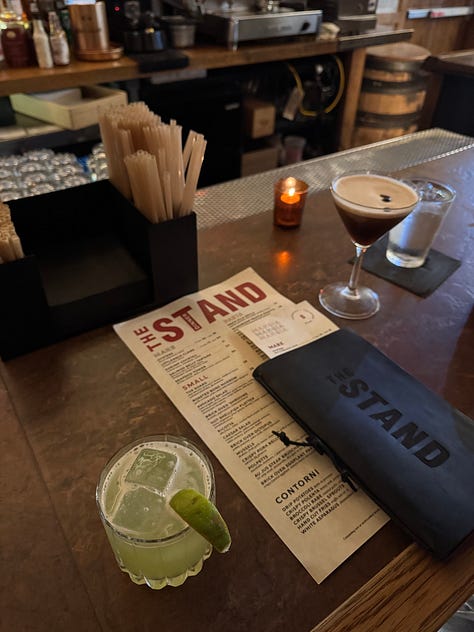
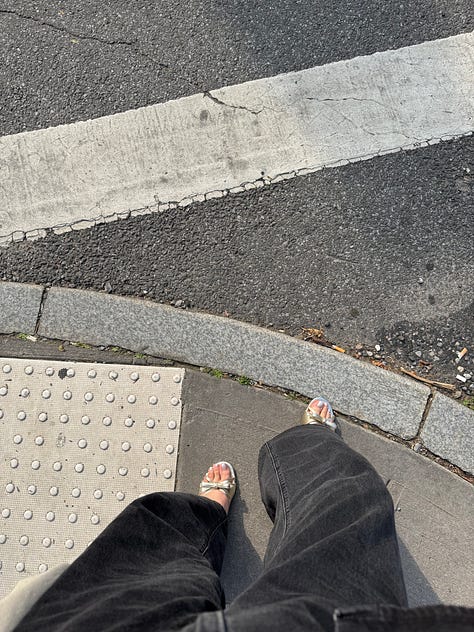
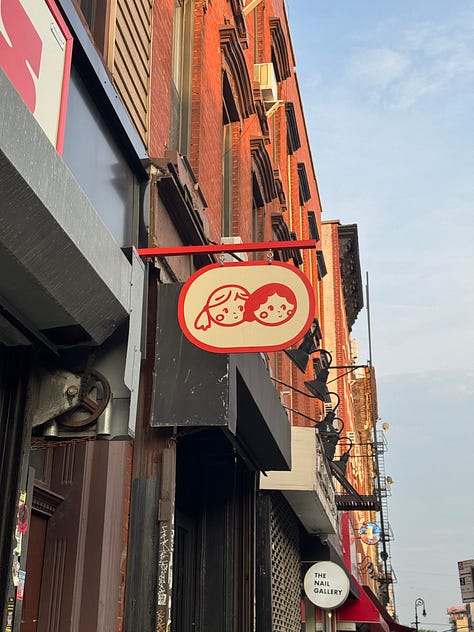
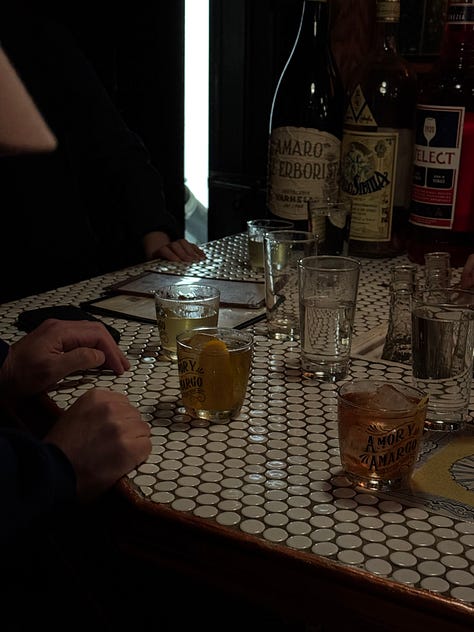
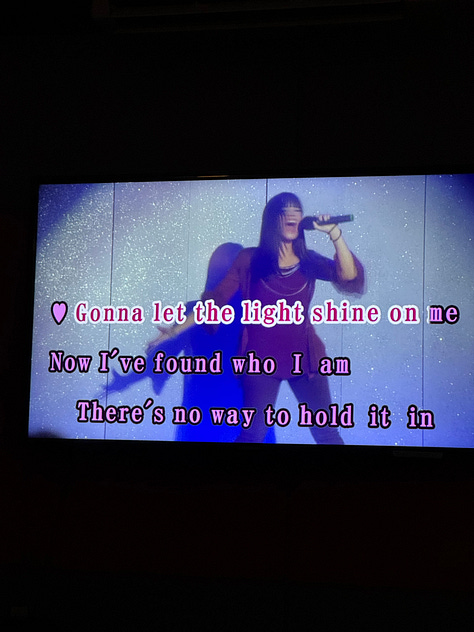
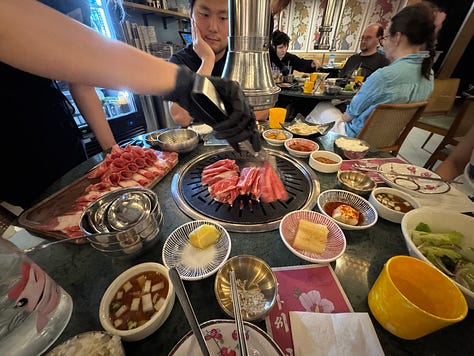
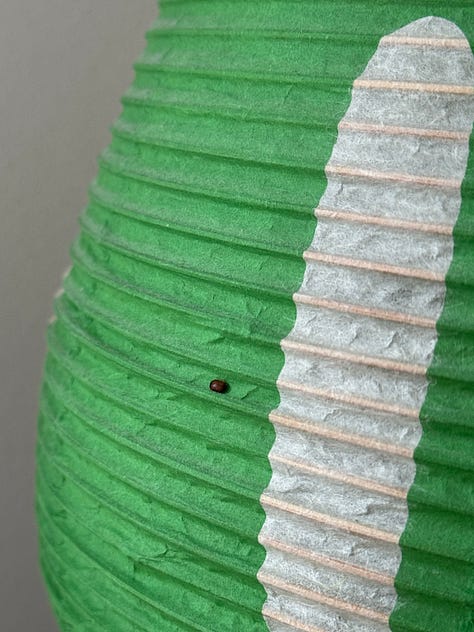
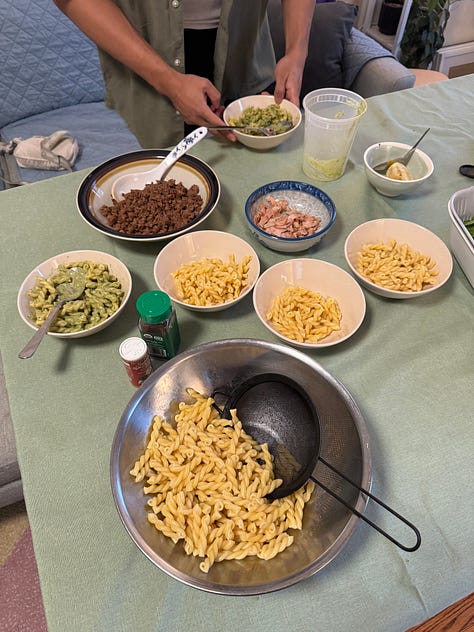
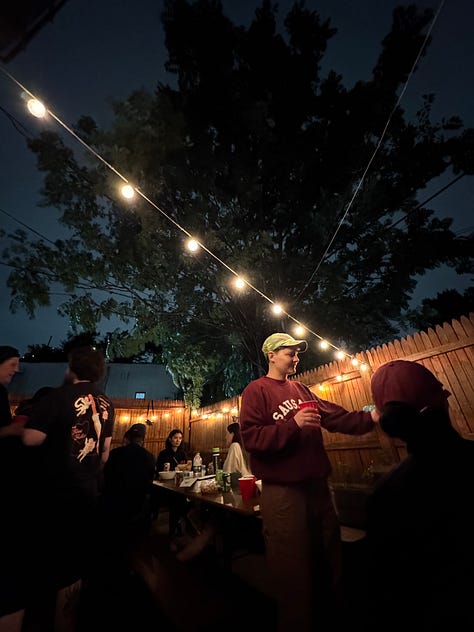
creative projects
photography
on the first of the month, i took some family portraits for a friend with their 4 month old son. we shot for an hour in their apartment building (thats really the window of time you get with a small child, also did you know that at that age babies cant hold up their own heads), then chatted and hung out for a bit after. i was a little nervous while shooting that i hadn’t adjusted the right settings (hard to see the screen in bright light), but i am actually in love with how they came out omg the photos are adorable. photography is a skill that i am grateful for because it so directly connects me with others. being able to take photos for people i love and to capture those moments in time, and for it to really be something they are grateful for and appreciate, is really nice. i want to share all the photos but will limit to just one:
writing
i didn’t make as much progress as i wanted on writing outputs this month, which is disappointing given the lack of travel. i put the blame on work, i was working a lot this month! but thats not to say that i wasn’t writing, i spent a significant amount of time finishing two essays that involved research (only one published, below):
the long process which it takes me to get to a final draft continues to grate. it just takes me so long to untangle what im trying to say, structure it, find the words (this is the hard part), and then it takes me a long time to wordsmith each line (i find this much easier to do). the final ready-to-share pieces are my 5th drafts, and i had gotten feedback from 1-2 friends somewhere along the process. i’m also noticing that i enjoy working on essays with different topics at the same time, so i can switch between them, rather than driving one to completion, then moving onto the next. i did this with my very first newsletters here, on intermezzo and look back. this habit also has implications for length of time to actually finish each piece, and sequencing of publication time. more things: i spent a lot of time writing outside the house (i’ve always relied heavily on cafes, but i also did some time at a sports bar nearby and found that surprisingly invigorating), earphones are absolutely critical (in the time i didn’t own earphones, i listened to many interesting conversations in the cafe that i’m glad i heard but really means i didn’t get much done), and printed many many sheets to annotate by hand. i genuinely don’t think i would have reached the final state of any of these essays in the time i did without printing them out. I LOVE MY PRINTER.
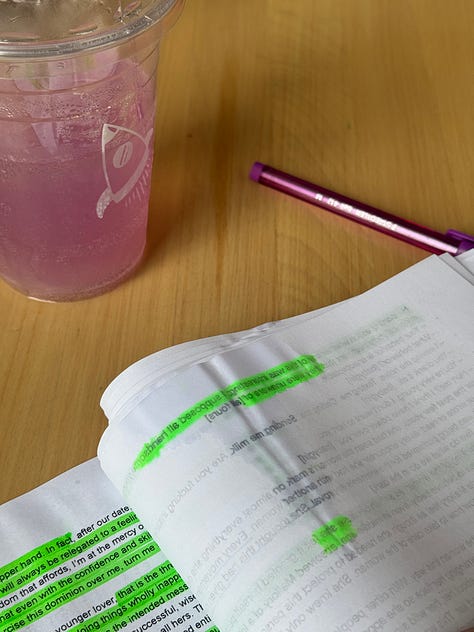
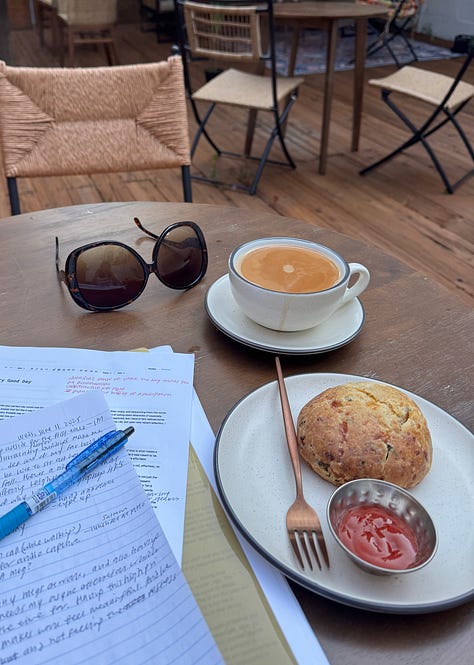
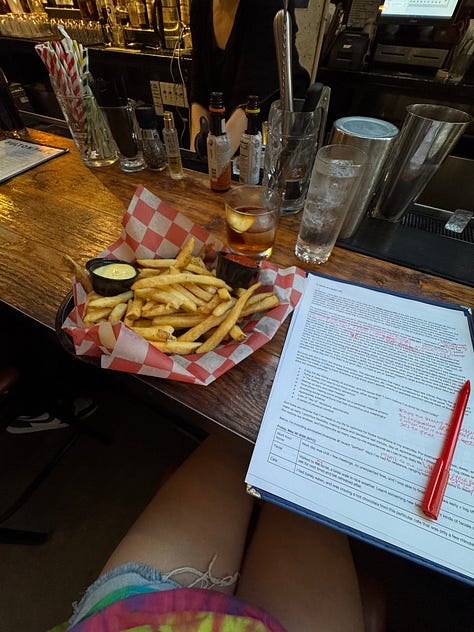
community
lots to say about community this month! this section is usually focused on events with others that are directly related to my creative endeavours, but today i’m expanding that to include supporting my friends’ endeavours too.
a friendly acquaintance i met at my yoga studio’s retreat last year recently completed her yoga teacher training, and i was honored to take the first group yoga class she taught, in the backyard of her brooklyn apartment! it was very cool to be there for a milestone :-)
i did another writing feedback session with
at the coolest cafe in east village, we talked through her recently published book review and my WIPs above. then we walked over for the tender summer reading that organized, where we heard from , , , — the red mood lighting, heartfelt words, and in their own voices, was very cool.two friends, purba and brandi, held a summer somatic workshop at the bakery, for some yoga and meditation and journaling, medicinal mushrooms, and delicious food (homemade olive oil cake, melon with olive oil and salt, bread). beautiful space, beautiful people. i took both of their portraits earlier this year, see them here and here!






somatic workshop at the bakery with brandi and purba ! attended the cabi foods x sushi counter collab menu launch party, in support of cabi! we got drinks at a nearby bar afterwards and played FMK and it was very funny
attended a friend’s pride BBQ in their backyard! and a pesto making pasta party at another’s (where i played wavelength for the first time and every hint became a hilarious storytelling exercise featuring someone in the room)!
dropped into a friend’s monthly book club, was my first time joining. it was all women (coincidental this month), and we discussed breasts and eggs by mieko kawakami, which is very much about being a woman. i will say that this didn’t make it to this month’s reading wrap up below, because i didnt finish the book (in my defense, i joined on very short notice and just couldn’t fit it in my schedule)!
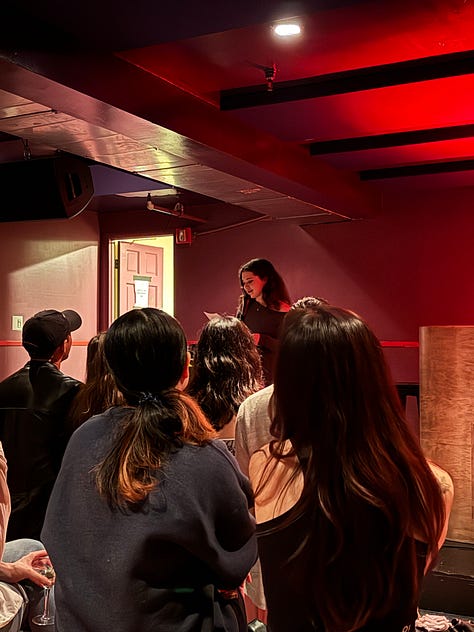
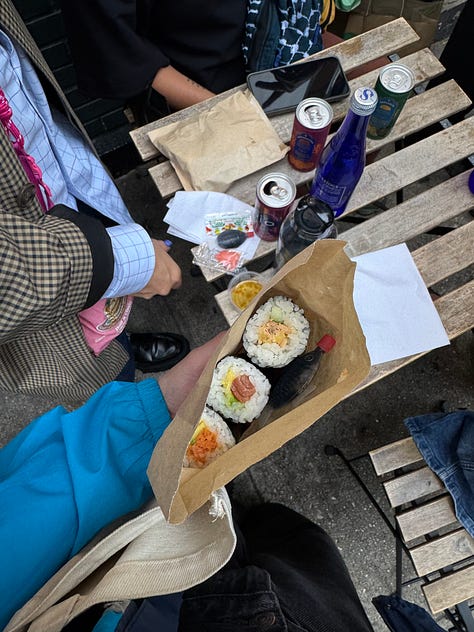
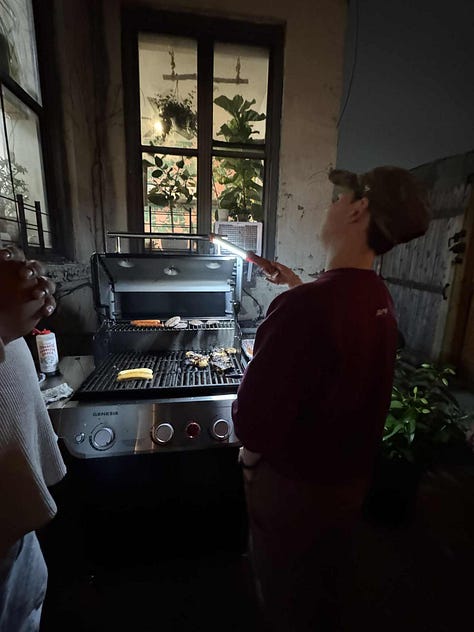
what i read
i had curated a whole to-read book list for pride month and fell so short of it, but at least i read james baldwin and lots of queer reads from small presses (that i’d purchased but hadn’t yet read) !! i also ended up reading many essays on current events, for obvious reasons.
books
the fire next time by james baldwin [nonfiction] — 4/5. my first baldwin! i thought the letter to his nephew (“my dungeon shook”) was so powerful and brilliant. "down at the cross," the second essay that makes up the bulk of the book, i found more interesting and contemplative than powerful. i personally don't really enjoy long stream of consciousness / fluid structures, but the insight and clarity and truth in his words still come through. what i was most struck by was his compassion, empathy, love, and what a genuinely good person he seemed. to see and articulate such horrors, and still be able to project such warmth and optimism? hope, kindness, dignity, self respect?
It will be hard, James, but you come from sturdy, peasant stock, men who picked cotton and dammed rivers and built railroads, and, in the teeth of the most terrifying odds, achieved an unassailable and monumental dignity
I spent most of my time in a state of repentance for things I had vividly desired to do but had not done
But what was the point, the purpose, of my salvation if it did not permit me to behave with love toward others, no matter how they behaved toward me?
giovanni’s room by james baldwin [novel] — 5/5. i think on my normal scale, this was a solid 4 star, but there is something that compels me to give it a 5 star, so here it is. there’s something about the self destruction that you can’t look away from, the sense of doom and inevitability, narrator showing equal parts clarity and obfuscation. the writing was wonderful. but for a novel about two men in a relationship, written by a gay man, i was kind of shocked by the attitude toward women, giovanni specifically, the animosity and outright dislike, and was pained by the interactions between david + women (the two he sleeps with, basically.) i dont understand david (the main character). i enjoyed bonnies review!
People can't, unhappily, invent their mooring posts, their lovers and their friends, anymore than they can invent their parents. Life gives these and also takes them away and the great difficulty is to say Yes to life.
I did not tell him my decision, that would have broken my will. I did not wait to have breakfast with him but only drank some coffee and made an excuse to go home. I knew the excuse did not fool Joey; but he did not know how to protest or insist; he did not know that this was all he needed to have done. Then I, who had seen him that summer nearly every day till then, no longer went to see him. He did not come to see me. I would have been very happy to see him if he had, but the manner of my leavetaking had begun a constriction which neither of us knew how to arrest.
I scarcely know how to describe that room. It became, in a way, every room I had ever been in and every room I find myself in hereafter will remind me of Giovanni’s room. I did not really stay there very long—we met before the spring began and I left there during the summer—but it still seems to me that I spent a lifetime there. Life in that room seemed to be occurring underwater, as I say, and it is certain that I underwent a sea-change there.
Red wine had been spilled on the floor; it had been allowed to dry and it made the air in the room sweet and heavy. But it was not the room’s disorder which was frightening; it was the fact that when one began searching for the key to this disorder, one realized that it was not to be found in the usual places. For this was not a matter of habit or circumstance or temperament; it was a matter of punishment and grief. I do not know how I knew this, but I knew it at once; perhaps I knew it because I wanted to live. And I stared at the room with the same, nervous, calculating extension of the intelligence and of all one’s forces which occurs when gauging a mortal and unavoidable danger … Under this blunted arrow, this smashed flower of light lay the terrors which encompassed Giovanni’s soul. I understood why Giovanni had wanted me and had brought me to his last retreat. I was to destroy this room and give to Giovanni a new and better life. This life could only be my own, which, in order to transform Giovanni’s, must first become a part of Giovanni’s room.
our migrant souls by hector tobar [nonfiction] — 2.5-3/5. i don't think i do well with lyrical nonfiction. i REALLY struggled with this book, it took me a long time to finish simply because i had to read slowly and often re-read sentences and passages to understand what it was saying. by the end, i resorted to actually reading out loud to myself, which i have never done, and was a successful experiment to get me to slow down and understand the words. the book was most comprehensible to me when it was narrative based and got deeper into details (i.e., the james earl ray bit, i liked how much it grounded history in place too). the rest felt like reading vignettes, tidbits one after the other about the general theme of "latino" that were kind of hard to follow and didnt contain enough detail for me to really get anything from it being the fleeting impression. i did enjoy the quotes from his students, and learning about the history in different latin american countries, but again felt that they were too sparsely covered. i didnt expect or necessarily want this to be a history book, but there were a lot of things that were repeated and rudimentary basic messages (we value family! we keep this country running! we deserve dignity!) and vignettes that (imo) didn't add a whole lot, that could have been removed and replaced and with new, substantive information on some really complex and relevant topics/history in a more linear way. or just expanding on people's stories! on a purely aesthetic note, the cover is really pretty, and the paperback has a really nice texture to it.
the paris trilogy: a life in three stories by colombe schneck [autobiography] — 2/5. i wanted to love this, but alas, i did not. the first story was def my favorite. it opened my eyes to a particular time and place and attitudes in french society, and i found her account of her teenage abortion to be a very interesting one. the feeling of invincibility she describes, ive not seen it put in these words and this context, and then the aftermath of it. the next two i enjoyed much less - i found them boring, and finished thinking "so?". the swimming framing in the last story really irked me, it felt cliche and unoriginal and adolescent (along with the musings on love), and i was mentally rolling my eyes at each description of her stroke. there were also bits in here that i wanted her to elaborate more about, events and things she references multiple times, including her father's death, her mother's inability to love, which she never does. many seemed to find the book powerful, but i found it lacking potency.
the calder game by blue balliett [novel] — 2.5/5. i found a copy in the ace hotel’s little library section, saw it was signed (!!), and snatched it right up. the first book in this series, chasing vermeer, was one of my favorites growing up, and i still remember how much i treasured my copy. i owned only the first two books of the series, so seeing this one, the third book of the series, made me really happy, a true blast from the past. the story itself fell short for me, the mystery was meh, and none of this book was very exciting. but i really do love how she incorporates and centers art in her books for children, and it was a v interesting experience reading this thinking about how differently i might have received this story if i read it in middle school. i've now been to chicago, i know who alexander calder is and i've seen his work live, i've been to oxford. i really loved the illustrations in this book, and remember how much i enjoyed them in the past too (its the same illustrator as for the series of unfortunate events!). i wouldn’t recommend, but it was a nice literary revisiting for me.
small press + zines
get l-ready with me by azin lim [nonfiction] — bought at the fukuoka art book fair. the photography was great, i liked the illustrations too. there wasn’t a lot of substance writing-wise, but as a whole i appreciated the message and queer female / butch / femme representation and how she expresses both sides.
the chromatic fantasy art magazine by HA [zine] — bought at silver sprocket in SF. the chromatic fantasy was one of my favorite reads last year, and i really enjoyed learning about their process and thinking behind that graphic novel.
SVA ink magazine, spring 2024 + fall 2024 [comics] — got for free at MOCCA fest, each issue features short comics by SVA students and an interview with an established artist (including HA!). i enjoyed reading at a coffee shop to start my day :-)
Gay Sailor Tattoos by R.J. Gillis [zine] — bought at other people’s clothes. this was cute and had nice tidbits, but i expected more substance honestly!
be gay, do crime movies by aysen gerlach [zine] — bought at the NJ art book fair. this was amazing. i love all her stuff. highly recommend, and the other zines in the “just lookin” series! from the intro:
In this issue of Just Lookin’, I will subdivide and dissect the homoerotic undertones of some of my favorite “dudes rock” crime films, celebrating their tortured masculinity, their pulsing testosterone, and, most importantly, their doomed yaoi.
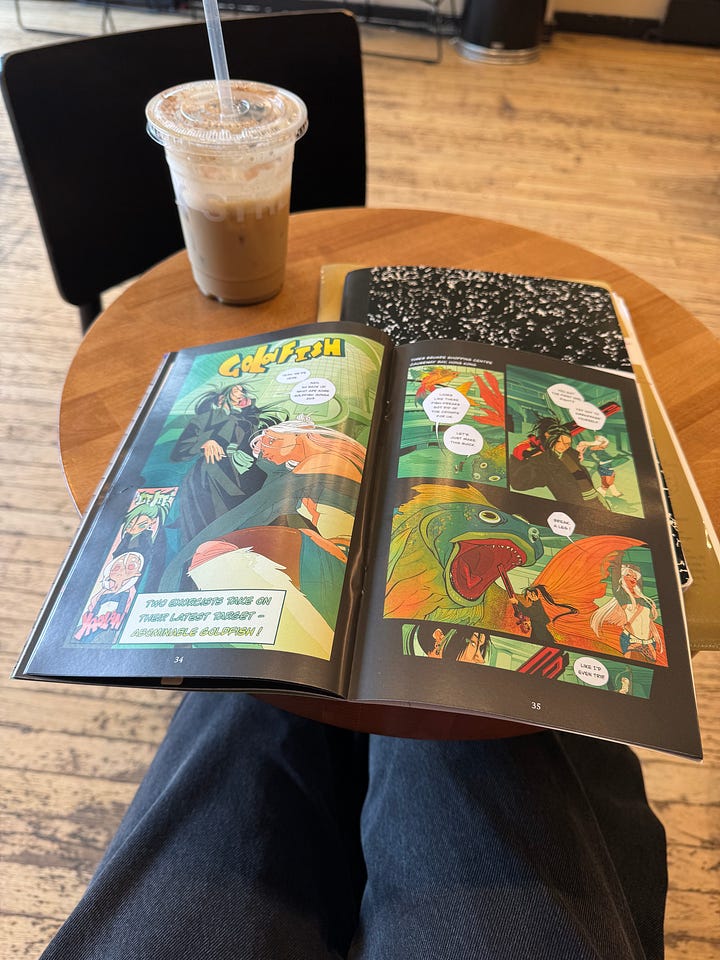
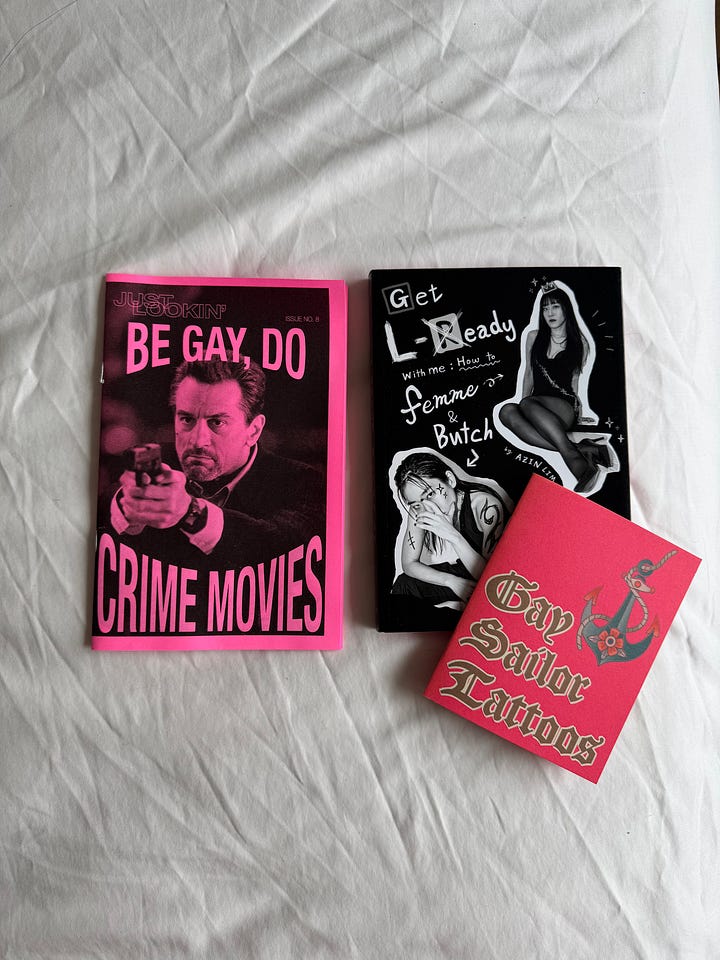
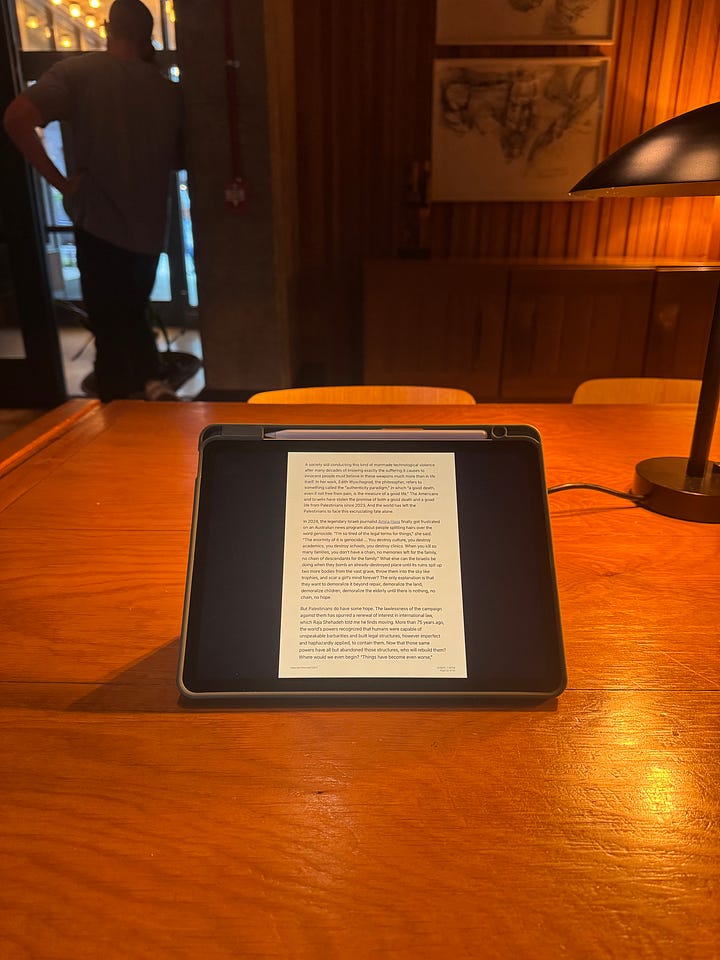
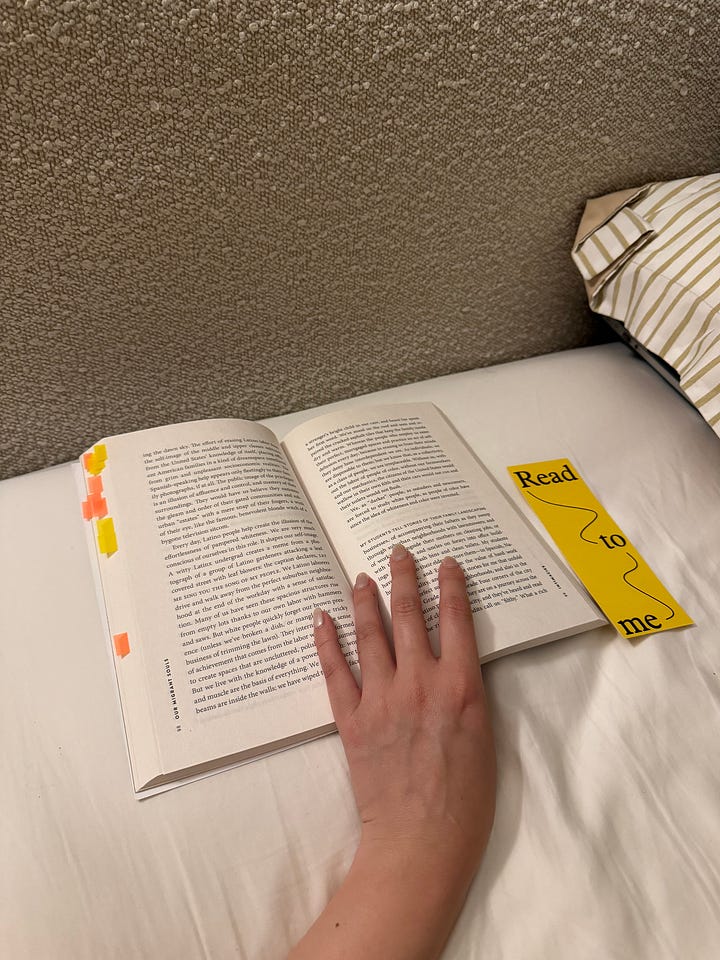
essays
current events
No more endless war, no more endless violence by
Israel's Undeniable War Crimes in Gaza (no paywall) by suzy hansen (the new yorker) side note, suzy hansen’s book Notes on a Foreign Country is one of my favorite of all times. i had the pleasure of meeting and chatting with her at my internship in DC in 2019, she is so impressive
How to Protest Without Upsetting Anyone by
Systems are crumbling – but daily life continues. The dissonance is real by adrienne matei (the guardian)
The Folly of A War With Iran by
Andrew Cuomo Is Worse Than You Even Know by Nathan J. Robinson (current affairs)
#226: New York’s mayoral race is a parable by
She Won. They Didn't Just Change the Machines. They Rewired the Election. by
feminism
The Dirty Work of Feminism in Justifying Terrorizing the East by
What Would A Woman Do To An Unconscious Man If She Thought No-One Would Find Out? by
being a woman, dating
Plight of the omakase eaters by
ten ways my tits robbed me of my adolescence by
back in the city i'm just another girl in a sweater by
I Am So Fucking Tired of Listening To Women My Age Complain About Being Old and Washed by
Why is No One Listening Anymore? by
#224: Aging out of precociousness by
OnlyFans billboards are taking over by
Gangbangs, OnlyFans, Feminism and Lily Phillips by
When Cool Gets Acquired: What 113,000 Community Reactions Reveal About the Rhode x e.l.f Deal by
tech
- / a fascinating look at how chatGPT lies, i saw very similar answers returned when i called it out for fabricating things
The Limits of Ethical AI (Lighthouse Reports)
After Notice and Choice: Reinvigorating “Unfairness” to Rein In Data Abuses (Stanford Law Review)
books and writing
what i watched
because i was never on a plane this month, i watched no movies and almost no TV (only a couple episodes of the windbreaker anime, and overcompensating on prime). but i did watch some great live shows!
an evening with mary beth barone @ union hall [stand up comedy] — mary beth barone used to host a monthly show called “the exhibition” at the PUBLIC hotel with michael cruz kane, that was one of the first stand up shows i saw, in 2019. i’ve been a fan since then, and have seen her live several more times, including solo shows and “overcompensating” with benito skinner (which is now the name of an amazon prime TV show he wrote and that just came out and they both star in!). it’s really cool to be able to see her success and the evolution of her career, and to be able to see her perform live still! and i enjoyed this show :-)
stand up show at the stand [stand up comedy] (not pictured) — watched on a sunday with the grad school friend that i went to my first ever live comedy show with. the show was just OK! but i’m glad we went. i’m trying to see more live comedy again.
NY liberty vs atlanta dream [sports] — first WNBA game !! it was a really close / exciting game, the entire stadium was packed, it was such a cute vibe. i looooooved the halftime performances, much preferred to the NBA ones ive seen. i saw the warriors game with the same friend earlier this year, and its been really fun watching games together !! a new part of the friendship, after several years.
the picture of dorian gray @ music box theater [play] — this show wowed me. easily one of the best broadway shows i’ve seen. loved the book when i read it in high school, it’s pride month (oscar wilde was queer), and this got such rave reviews, i felt i had to go, went the day before closing day of the extended run, so i almost missed it. i went on my own, which is another milestone, as i’ve never seen a broadway show alone. i have so much respect for sarah snook (the star of the show), holy crap. acting, incredible. her expressions, marvelous. stamina, stunning. by the end, you could literally see the sweat dripping down her face. it was exhausting for me to be so fully engaged the whole show, no intermission, to pay attention to what was happening in front of my eyes while also processing the words being spoken, i can’t even imagine how exhausted she must have been, and the focus required to execute all those moving parts, it was a one-(wo)man show where she played 26 characters and she was giving a monologue narrating the action, and constantly in motion with costume changes and running around on stage. it felt almost manic, running on adrenaline.
while there are several hundred marks on stage that have to be hit with millimeter precision, the more intense specificity of movement is actually about the rhythm of movement between those marks. It’s how Sarah, the camera team, the costume team, and the mechanists who move the set elements build and develop the movement from specific point to specific point. That’s the living, breathing organism of the piece that has its bend and flex each night. — Kip Williams in Slant
i had heard the show was “mostly screens” (when i was looking up which seat to buy), so i was curious but skeptical about how immersive or “worth it” this would feel. i thought the use of screens and cameras was really interesting, especially the use of filters on the phone, which could easily have felt like it was trying too hard. its rare that the portrayal or use of screens enhances a live experience, i think, but this really hit the mark, so multidimensional and complex, big ups for all the crew on stage too. (i’m seeing sunset boulevard in a week, and this comment comparing use of screens between these two productions is making me quite curious.) it was also quite funny, the lines delivered in a theatrical and self aware wink wink way, which i didnt expect. the thing that did carry through from the book, and my only complaint, is that i didnt find the bulk of the second half as compelling. the story to me just kind of drags and isn’t very interesting. i would say go watch it, but the run is now over, so you technically cant. so all i can say is that it was phenomenal. brava. what a feat. further reading: interview with sarah and kip in playbill, interview with kip in slant, profile with sarah in vogue (no paywall).




other notes
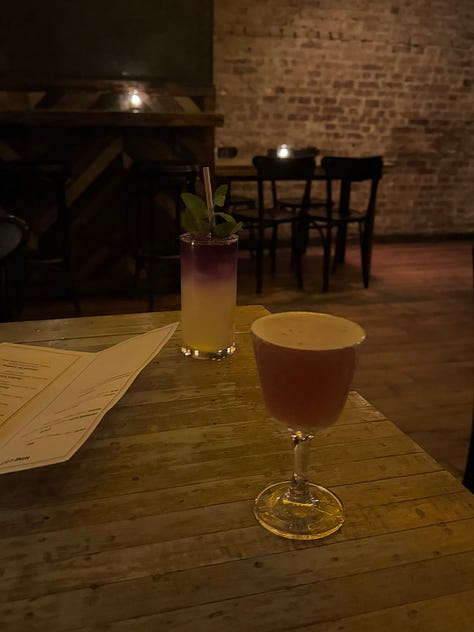
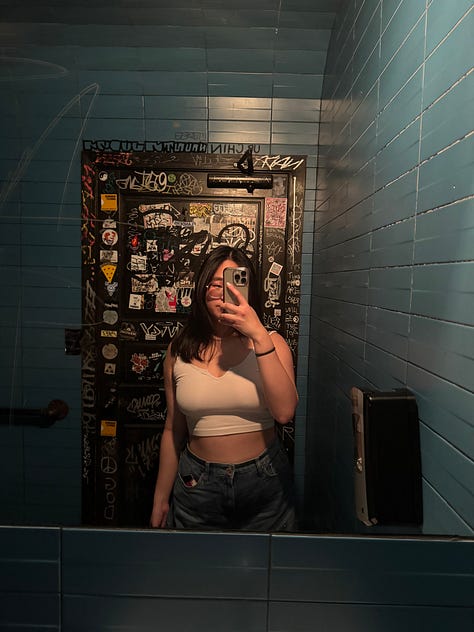
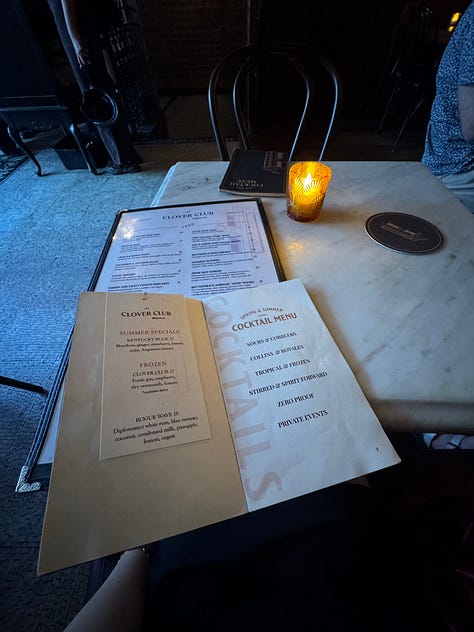
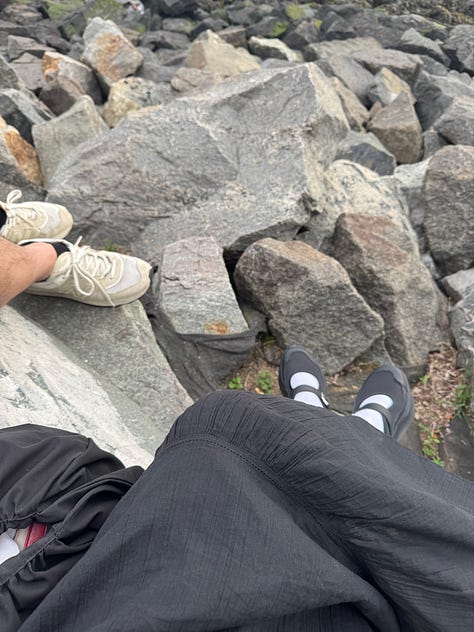
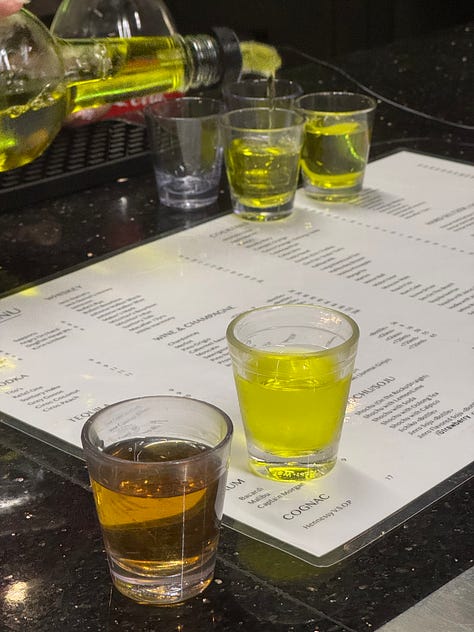
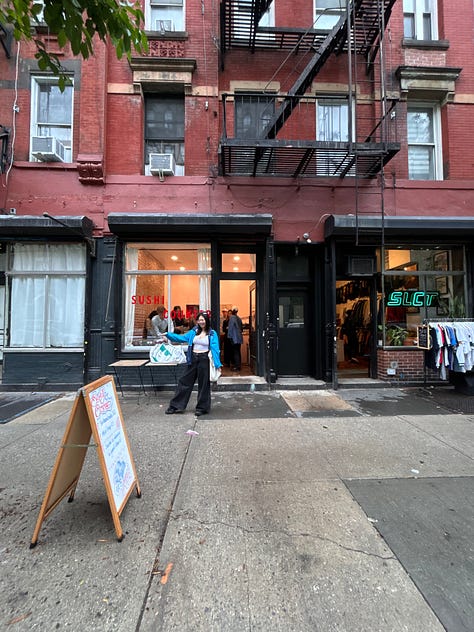
i’ve been listening to my way by frank sinatra, and it’s my life by bon jovi. i’ve known these songs for many years, but never listened to them in proximity. i finally made the connection that the line “like frankie said i did it my way” (from it’s my life) is a reference to my way! i dont think im very good at catching pop culture references generally, so it was neat to find this one!
other fun lyrics:
i’ve been conducting interviews for work, and it’s been interesting. i definitely enjoy asking hypothetical and getting to know you type questions much more than behavioral, to get a feel for how people think, how they communicate, self awareness. and im shocked by how rapidly AI has been adopted and its infiltration into literally everything. people’s reliance on AI baffles me, like people are feeding questions directly into LLMs during zoom interview, thats crazy. (i didn’t notice any instances of this, but my colleagues and friends have apparently)
this month i had a lot of burgers + KBBQ + alcohol. this is out of the norm.
questions for you
Did you have any classes that similarly changed your life, was formative in some way? Or that you appreciate more now?
If you’ve created your own program of self-study, what was the topic, what inspired it, what was the program?
I’ve been thinking a lot about mutuality of connection. When was the last time you felt a strong connection to someone, but they didn’t (seem to) feel the same way? How often does this happen in your life?




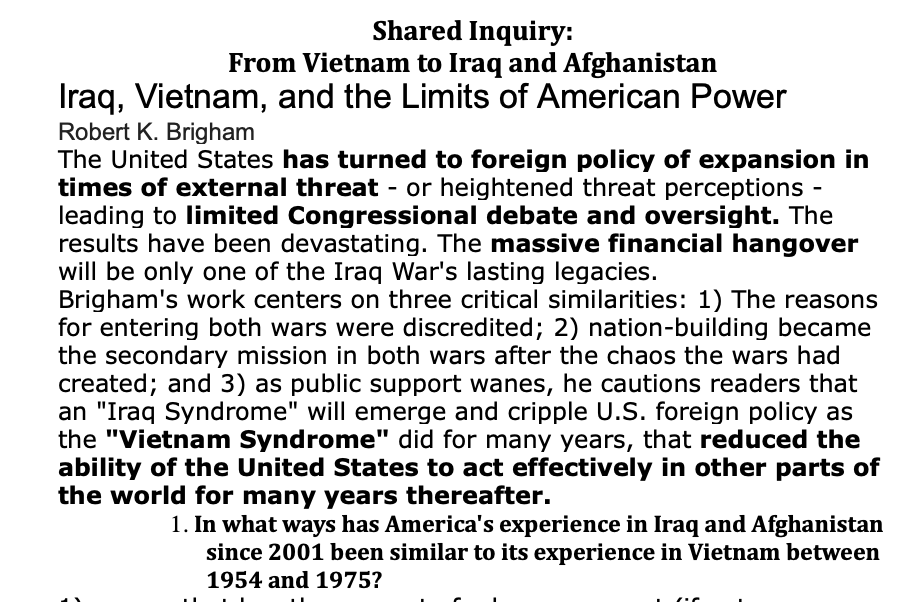
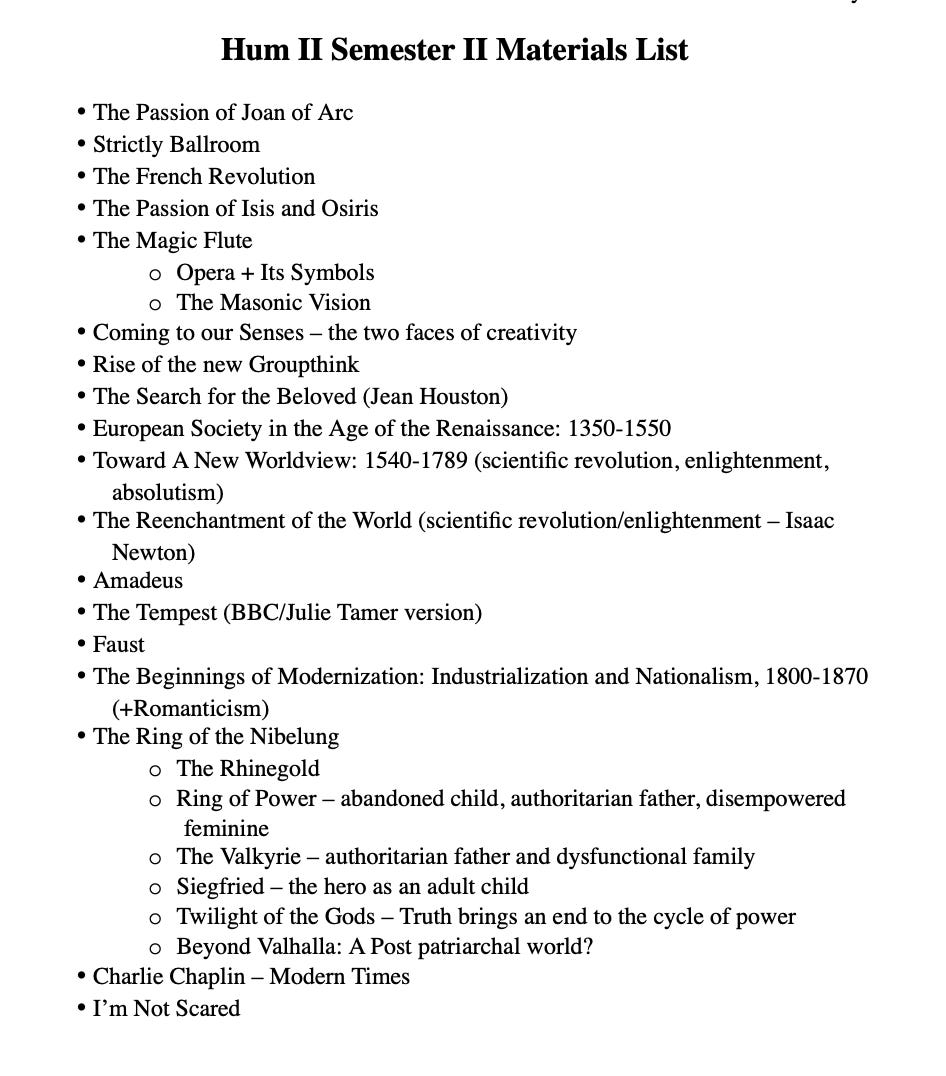
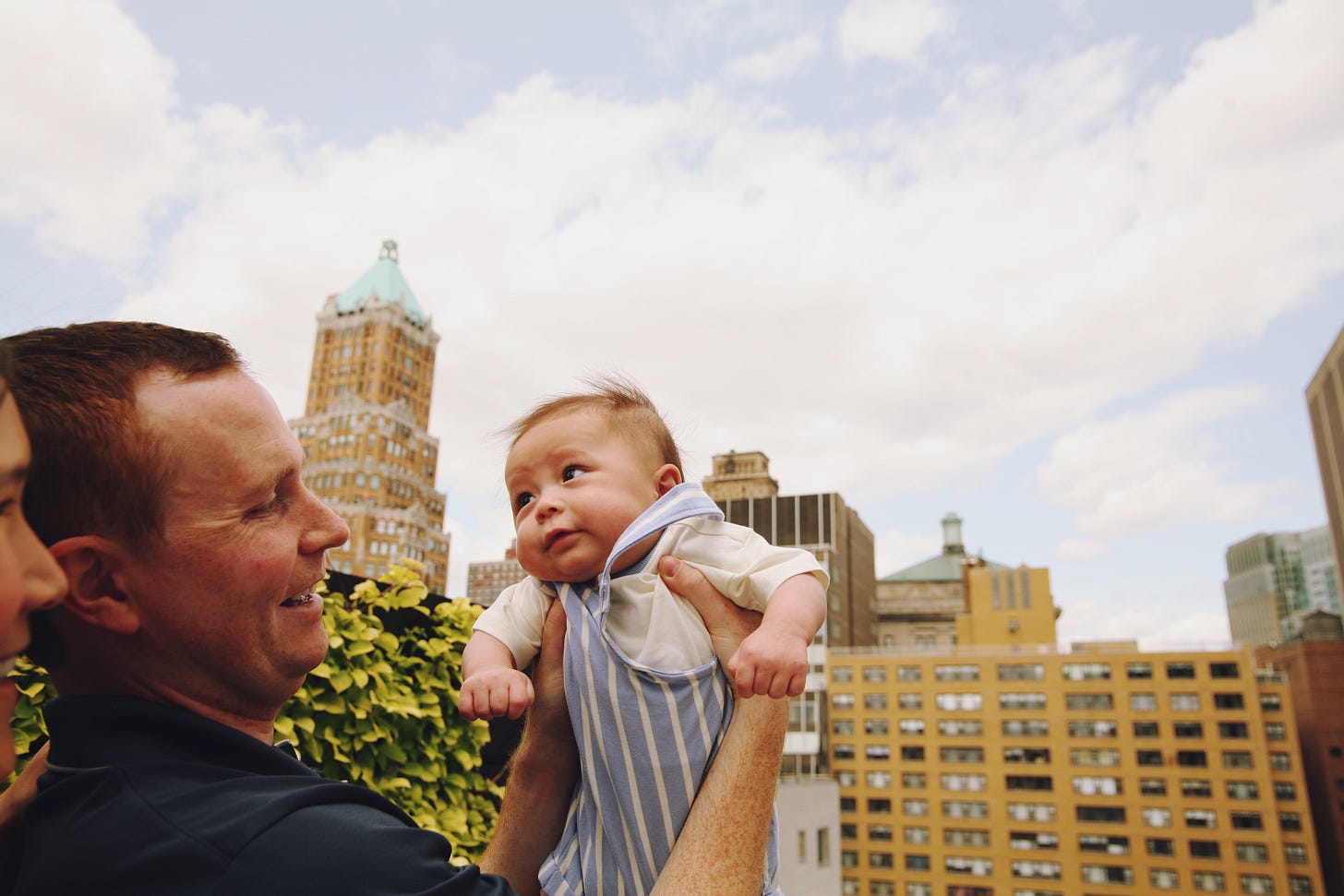


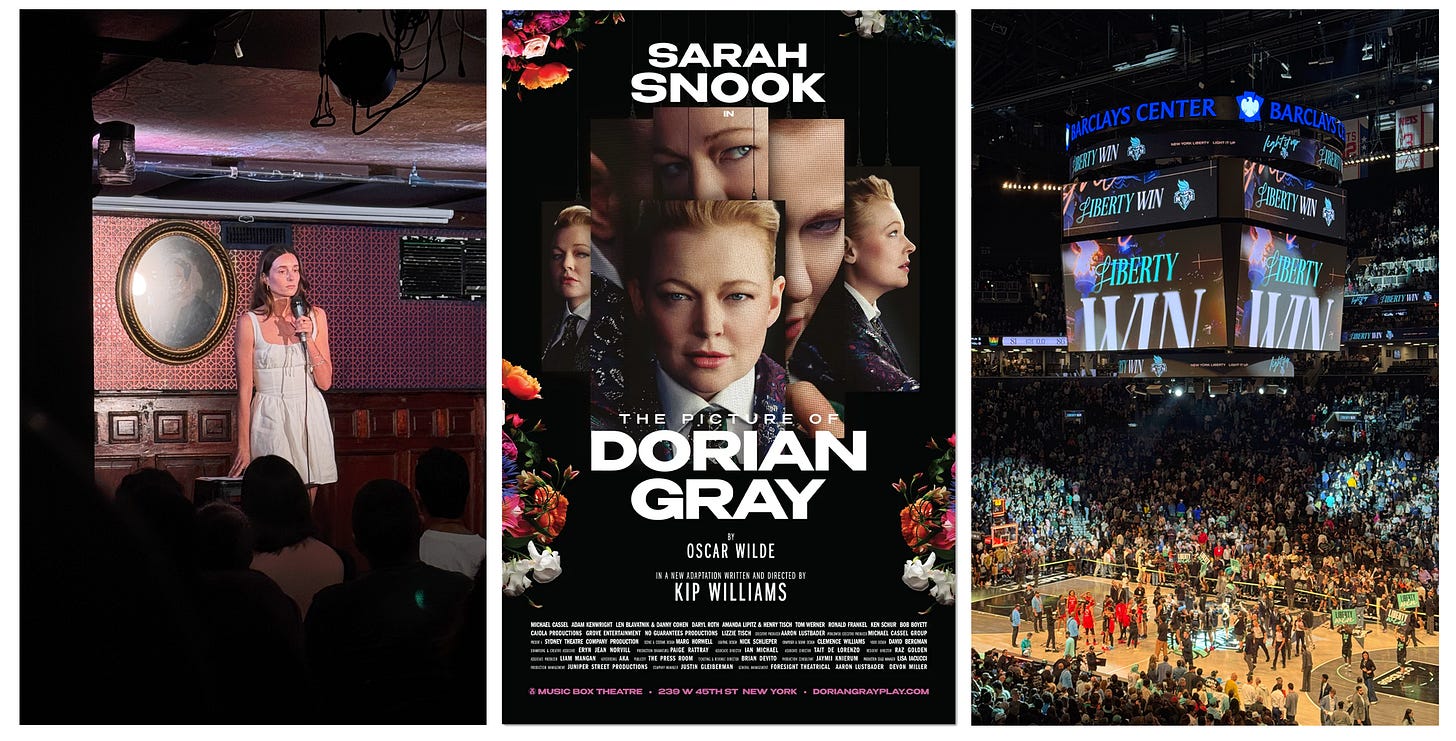
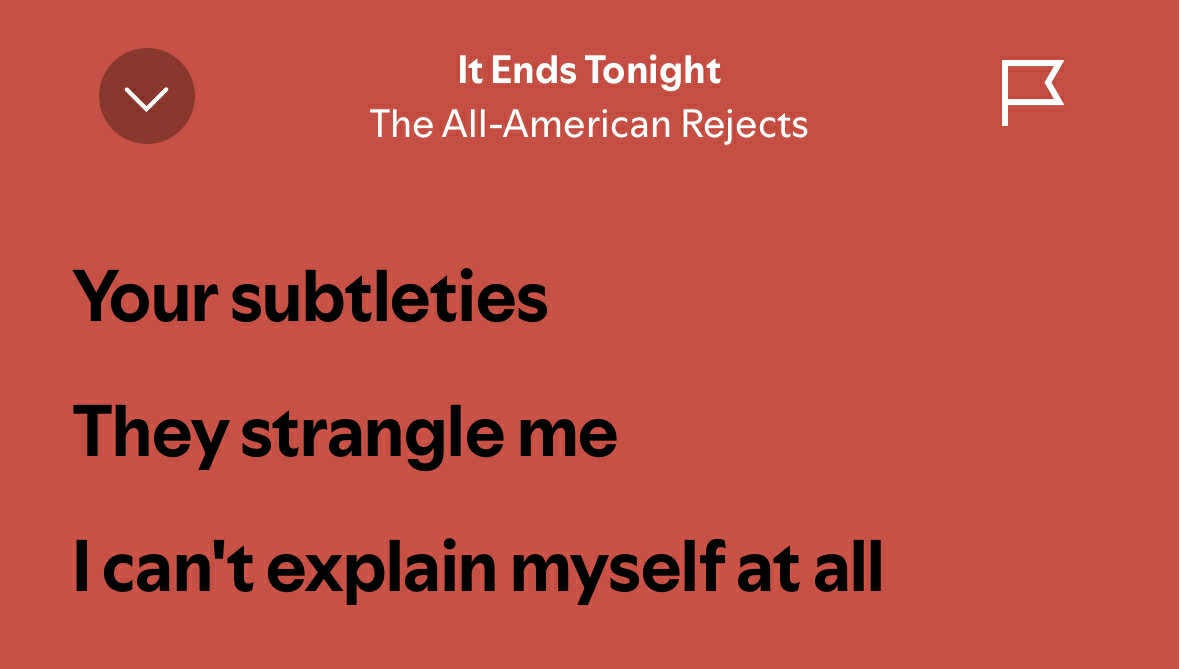
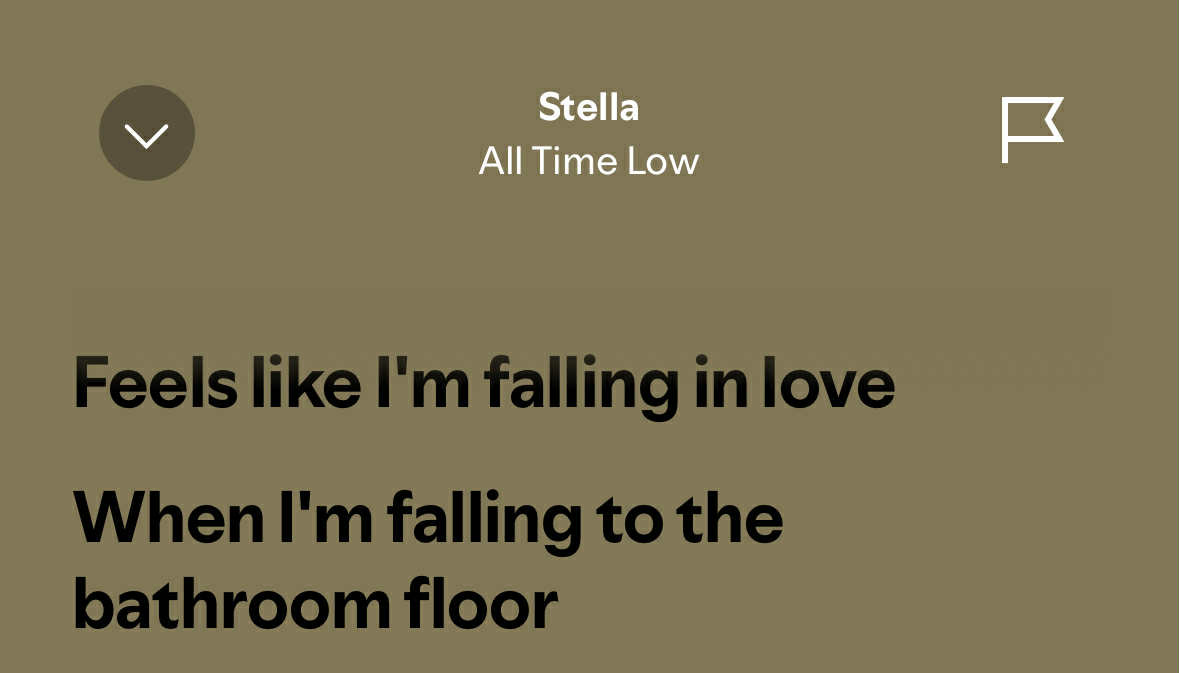
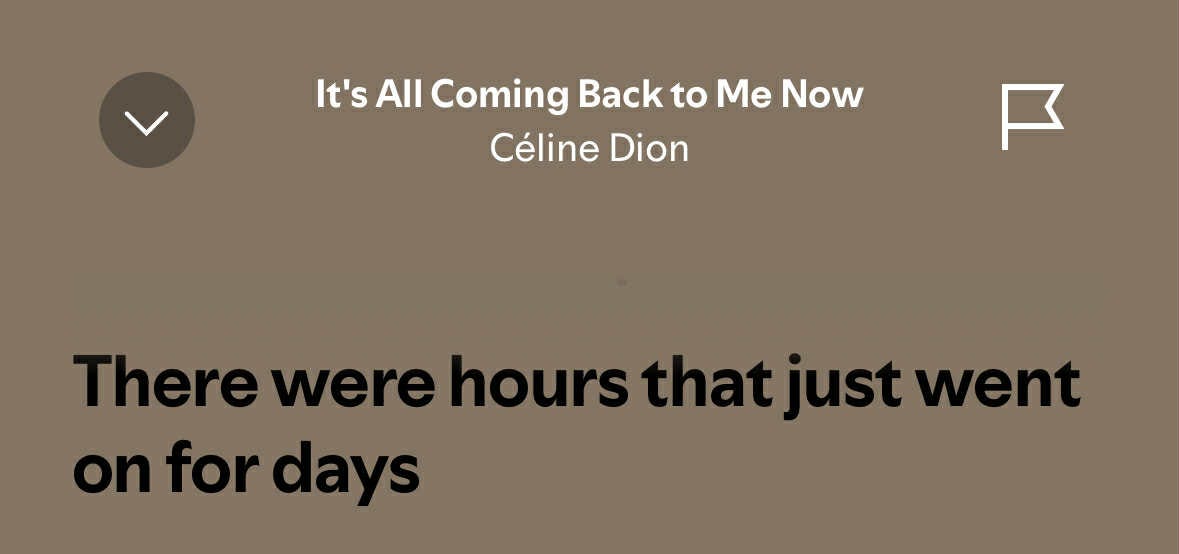
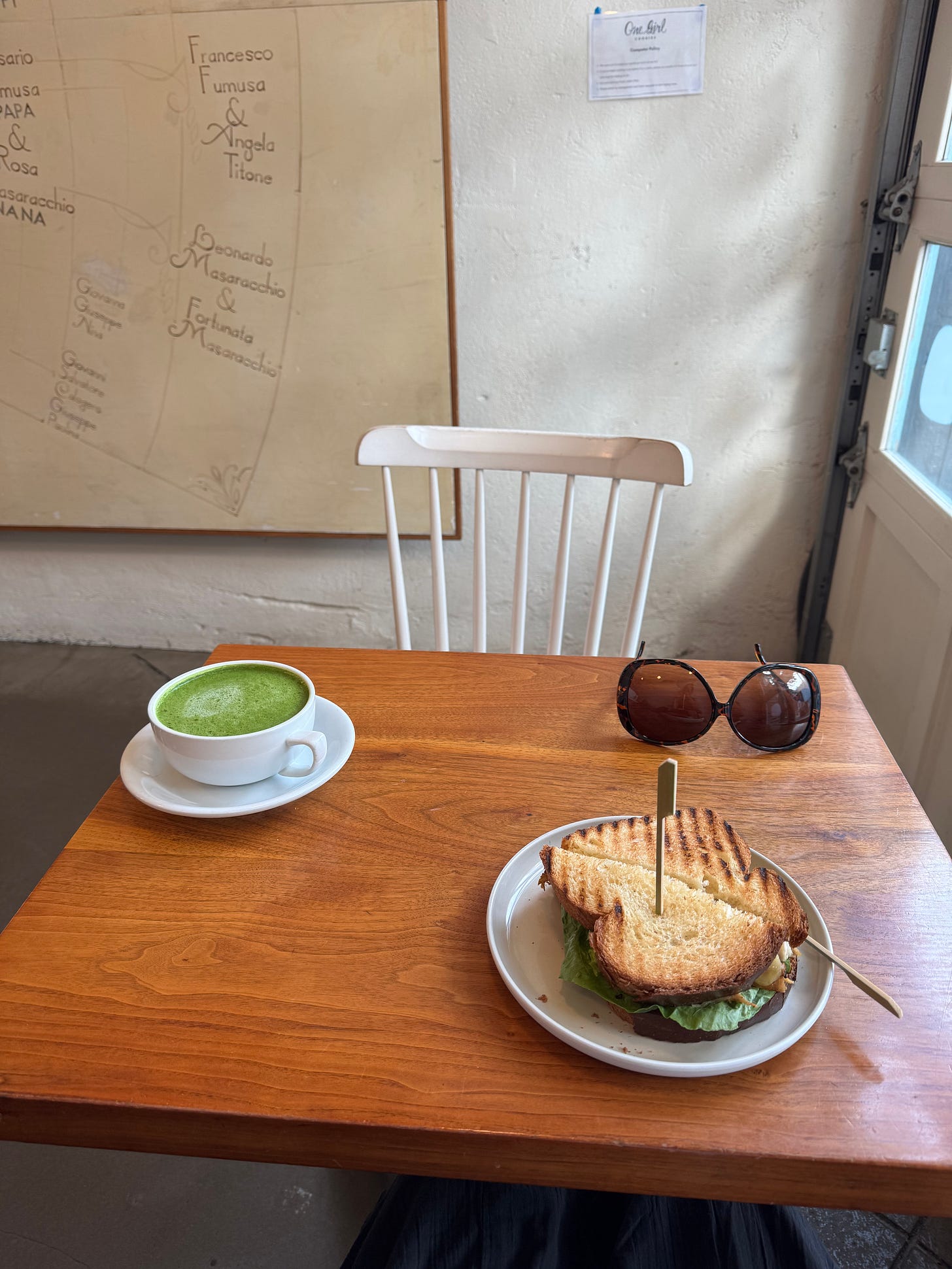
Hector Tobar teaches with me in the Literary Journalism Program at UC Irvine and I love that he wrote his beautiful book as a letter to students. He is in excellent company with the other books you read in June--and thanks also for reading the QA with Sheon.
Oh my gosh so glad the Tender Summer reading made it in here! Thank you for coming - it was such a great night!